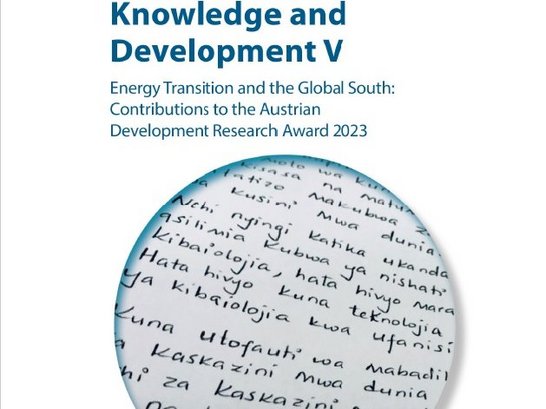Austrian Prize for Development Research
Call for Applications: “Austrian Prize for Development Research 2025”
As of July 9, 2025, applications are open for this year’s Austrian Prize for Development Research. Submissions are accepted until 30. November 2025. The prize is awarded by the Federal Ministry for Women, Science and Research (BMFWF) for outstanding achievements in the field of development research. The OeAD (Austria’s Agency for Education and Internationalisation) is responsible for its organizational implementation. The prize consists of two categories
- A Main Prize: The Main Prize is awarded to an individual who has made a significant contribution to development research in or in connection with Austria within the last five years prior to the call for applications. The Main Prize is endowed with €7,000.
- A Young Researchers’ Award: The Young Researchers’ Award recognizes an outstanding scientific work or publication in the field of development research. It is endowed with €3,500.
The main prize
The Main Prize is awarded to an individual who has made a significant contribution to development research in or in connection with Austria within the last five years before the call was issued. The Main Prize is endowed with €7,000. All persons with a doctorate or PhD who work at an Austrian university or non-university research institution (this also includes persons with non-Austrian citizenship) or researchers with Austrian citizenship who work at a foreign university or research institution are eligible to apply for the main prize without age restriction. The application including substantiation of content and subject-related evidence (publications, reviews, project reports, media contributions, etc.) must be submitted using the “Submission form for the main prize”.
Documents required for submission:
- The fully completed, signed and scanned submission form (pdf and text document)
- A current CV (PDF, text document)
- Evidence (documentation of projects, initiatives, publication lists with web links from the past 5 years as PDF or text document)
Submission by e-mail to: entwicklungsforschungspreis@oead.at
Deadline for submission is 30 November 2025 (23:59 Uhr)
The Young Researchers' Award
The Young Researchers' Award honors outstanding scientific work and publications by young researchers with Austrian citizenship that deal with global and regional challenges in connection with the United Nations Sustainable Development Goals (SDGs). Persons up to 30 years of age with a Master's or comparable degree who have not yet completed their doctoral or PhD studies at the time of submission are eligible for the Young Researchers' Award. The application is made by submitting the “Submission Form for the Young Researchers' Award” and a scientific text with a maximum of 35,000 characters, which has been written and/or published in the period of 3 years prior to the call and which deals with interesting aspects of development research in theory and/or practice.
Documents required for submission:
- The fully completed, signed and scanned submission form (PDF, text document)
- A current curriculum vitae (PDF, text document)
- Text in digital form, maximum 35,000 characters (PDF, text document)
Submission by e-mail to: entwicklungsforschungspreis@oead.at
Deadline for submission is 30 November 2025 (23:59 Uhr)
Decision criteria, selection and awarding
After the formal review by the OeAD, the submissions will be forwarded to an expert jury, whose members will be announced on this website by mid-August 2025.
The jury is made up of
- three experts from the field of development research,
- two representatives of non-governmental organizations relevant to development policy,
and one representative each of the BMFWF and the OeAD (both without voting rights, in an advisory capacity).
The decision criteria for awarding the main prize are
- Contribution to solving current global challenges, SDG relevance (50%),
- Scientific excellence, innovative approach, interdisciplinary and participatory research approach and relevance for Austrian and international development research (40%),
Contribution to knowledge transfer to the non-scientific public (10%).
The three applicants shortlisted by the jury for the main prize will be invited online to the jury meeting to present their projects, publications and/or initiatives in person and answer any questions.
The decision criteria for awarding the young researchers' award and selecting the winning text are
- SDG relevance (50%),
- Scientific excellence, innovative, interdisciplinary and/or participatory research approach (50%).
Voting in the expert jury is by simple majority.
The “Austrian Prize for Development Research” will be awarded in February 2026 by the Federal Minister for Women, Science and Research - FBM Eva-Maria Holzleitner, BSc - in a festive setting. Details under Terms and Conditions of Participation.
Fachjury
Univ.-Prof. Dr. Stefanie Lemke (BOKU) - Vorsitz
Univ.-Prof. MMag. Dr. Melanie Pichler (BOKU)
Univ.-Prof. Dr. Franziska Müller, M.A. (Universität Wien)
Dipl.-Verw.-Wiss. Thomas Vogel (Horizont3000)
Dr. Lukas Schlögl (ÖFSE)

